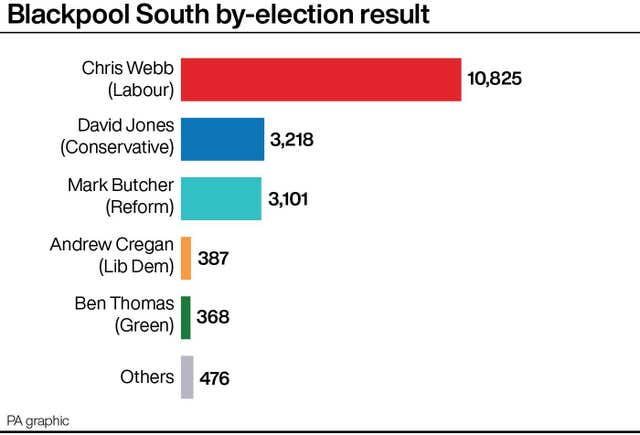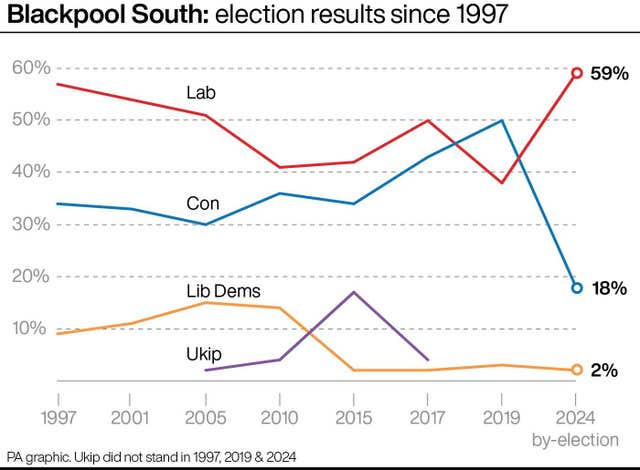Elections: Votes being counted in the West Midlands today as Tories suffer heavy losses nationally
Votes from local, Mayoral and PCC elections in the West Midlands are to be counted.

Labour has won the Blackpool South parliamentary by-election and made gains in council contests to heap pressure on Rishi Sunak.
Votes are being counted in the West Midlands today after yesterday's local, Mayoral and Police and Crime Commissioner elections, but nationally Labour have already inflicted losses on the Conservatives.
In the Blackpool South contest triggered by the resignation of former Tory MP Scott Benton following a lobbying scandal, Labour’s Chris Webb secured 10,825 votes, a majority of 7,607.
Tory David Jones came in second with 3,218 votes, just 117 ahead of Reform UK’s Mark Butcher.
Mr Webb said: “People no longer trust the Conservatives. Prime Minister: do the decent thing, admit you’ve failed and call a general election.”
The 26.33 per cent swing was the third biggest from the Conservatives to Labour at a by-election since the Second World War.
Labour leader Sir Keir Starmer said: “This seismic win in Blackpool South is the most important result today.
“This is the one contest where voters had the chance to send a message to Rishi Sunak’s Conservatives directly, and that message is an overwhelming vote for change.
“The swing towards the Labour Party in Blackpool South is truly historic and shows that we are firmly back in the service of working people.”
Tory deputy chair Angela Richardson told the BBC: “The result was not unexpected. I think, given the circumstances that caused the by-election in the first place, it was always going to be difficult for the Conservatives.”
Elections expert Professor Sir John Curtice said: “The only thing that’s stopped this result from being basically an unmitigated disaster for the Conservatives was the fact they just narrowly squeaked ahead of Reform.”
He added: “Basically the project that Rishi Sunak is meant to be there to achieve, which is to narrow the gap on Labour, that project still has yet to provide any visible benefit.”
The Tories were also facing losses in council elections across England, after votes took place in 107 authorities including in the Black Country the Staffordshire.
Most of the council seats up for re-election in England were last contested in 2021, at the peak of Boris Johnson’s popularity as the Covid-19 vaccine was rolled out.

Tory peer and polling expert Lord Hayward said he expected the Tories to lose upwards of 400 seats but he suggested that Mr Sunak’s position was not in immediate jeopardy.
“In recent days I have been left with the very clear impression that, amongst Tory MPs, the ‘let’s have a leadership election’ balloon has been substantially deflated,” he said.
However, “an audible, very small group will disagree and probably do so early”.
A strong showing by Reform UK will add to Tory unease about Mr Sunak’s ability to lead the party to a general election victory.
Reform UK’s leader Richard Tice told the PA news agency his party had “rapidly become the real opposition to Labour, whether it’s in the North, the Midlands, we know it’s the case in Wales”.
In Sunderland, one of the few councils where Reform fought every seat, it beat the Conservatives into third place in 16 of the 25 seats up for grabs while Labour made a net gain of six to increase its comfortable majority.
A total of 11 mayoral contests are also taking place, including in the West Midlands and for the London mayoralty between frontrunners Labour incumbent Sadiq Khan and Tory challenger Susan Hall.
Forecasts have consistently put Mr Khan ahead of Ms Hall, with a poll published on Wednesday by Savanta giving him a 10-point advantage after his lead tapered over the campaign.
Allies of Mr Khan said they expected a “close” fight, with the result announced on Saturday.

Conservative mayors Andy Street in the West Midlands and Lord Ben Houchen in Tees Valley are also facing re-election battles.
Victory for either would be a boost for Mr Sunak, although Labour point to the mayors distancing themselves from the current Tory leadership.
Voters across England and Wales also had the chance to choose their police and crime commissioners.
The final results from the various elections are not expected until Sunday but key developments include:
– Labour won Rushmoor in Hampshire for the first time and claimed the council in key general election battleground Redditch.
– Labour won Hartlepool council, regaining ground in an area where the party suffered a Westminster by-election humiliation in 2021.
– Labour won Thurrock, one of its top targets and an area of the country that will be a key battleground with the Tories at the next general election.
– The Tories clung on by a single seat in Harlow, a council targeted by Sir Keir on the eve of polling day.
– With 33 of 107 councils fully declared, the Tories have lost three authorities and a net 92 councillors, while Labour gained four authorities and 62 councillors.
– The Greens put on 13 councillors, the Liberal Democrats gained eight while there were also increases for independents and residents groups.
– Labour gained the Cumbria police and crime commissioner from the Conservatives.
The gains for Labour came despite setbacks in some previously safe areas, particularly those with large Muslim populations, where the party’s candidates may have suffered as a result of Sir Keir’s stance on the Israel-Hamas conflict in Gaza.
Labour lost control of Oldham after gains by Independents, with the Gaza crisis likely to have been a factor.
The Liberal Democrats said they expected to put further holes in the “blue wall” of Tory battleground seats in southern England.
Green co-leader Adrian Ramsay said: “North and south, east and west, Greens are winning the trust of voters fed up with the chaos of the Conservatives and the U-turns of Labour.
“We are winning because our message of hope is being heard by new groups of voters.”
The relatively new requirement for voters to show photographic identification caused some high-profile problems, including for Mr Johnson, who as prime minister introduced the changes.
He was turned away while attempting to cast his ballot in South Oxfordshire, where a police and crime commissioner for the Thames Valley is being elected, Sky News reported.





